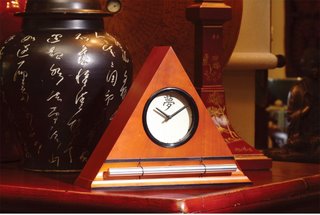
Dreams May Improve Our Memory - Toyokuni Utagawa, Flower Arrangement
Getting a good night’s sleep after trying to master a tough new task might just reinforce what you have learned.
European researchers say dreaming might be the brain’s way of replaying experiences and lessons so that they are fixed in the memory for use later on.
The scientists used advanced imaging technology and found that the same regions of the brain that are buzzing while we learn a new task are also active while we dream. This heightened activity was observed during the brief but active stage known as rapid-eye movement, or REM, sleep.
The study was published in the August issue of Nature Neuroscience and was led by Pierre Maquet of the University of Liege in Belgium.
Animal studies had shown similar results. Rats that ran new routes through mazes showed increased activity in the same portions of their brains when they slept afterward. But the human brain is more complex.
“It is wonderful to see such results demonstrated in humans for the first time,” said David Silbersweig, co-director of the functional neuroimaging research laboratory at the New York-Cornell Medical Center.
Why Sleep? Humans spend one-third of their lives asleep, but sleep’s purpose is poorly understood. Among other things, scientists believe dreaming may help sort out emotions, impressions and other ideas.
In the study, 18 volunteers ages 18 to 25 spent several hours learning how to quickly recognize symbols as they flashed on a computer screen and press the same symbol on a keyboard.
During the test, the activity in several regions of their brains was monitored by PET scans, which reveal how the brain is functioning by watching its use of glucose and oxygen, the fuels of brain cells.

Can Dreams Help Improve Our Memory?
Groups of volunteers were tested in several ways. Those who took the computer test for several hours, slept and retook the test when they woke up scored the highest, with even faster reaction times after they slept.
PET scans showed that during REM sleep their brain activity and blood flow were similar to when they were taking the test.
Researchers said the volunteers might have been practicing the test in a REM dream and storing what they learned.
However, Maquet’s team could not identify the precise cellular mechanisms involved. Nor are all memories consolidated only during REM sleep, the researchers said.
Boulder, Colorado—an innovative company has taken one of life’s most unpleasant experiences (being startled awake by your alarm clock early Monday morning), and transformed it into something to actually look forward to. “The Zen Alarm Clock,” uses soothing acoustic chimes that awaken users gently and gradually, making waking up a real pleasure.
Rather than an artificial recorded sound played through a speaker, the Zen Clock features an alloy chime bar similar to a wind chime. When the clock’s alarm is triggered, its chime produces a long-resonating, beautiful acoustic tone reminiscent of a temple gong. Then, as the ring tone gradually fades away, the clock remains silent until it automatically strikes again three minutes later. The frequency of the chime strikes gradually increase over ten-minutes, eventually striking every five seconds, so they are guaranteed to wake up even the heaviest sleeper. This gentle, ten-minute “progressive awakening” leaves users feeling less groggy, and even helps with dream recall.
adapted from abcnews.go.com by Joseph B. Verrengia

The Zen Alarm Clock transforms mornings, awakening you gradually with a series of gentle acoustic chimes Once you use a Zen Clock nothing else will do
Now & Zen – The Zen Alarm Clock Store
1638 Pearl Street
Boulder, CO 80302
(800) 779-6383
orders@now-zen.com
Posted in Bamboo Chime Clocks, Insomnia, sleep, Sleep Habits